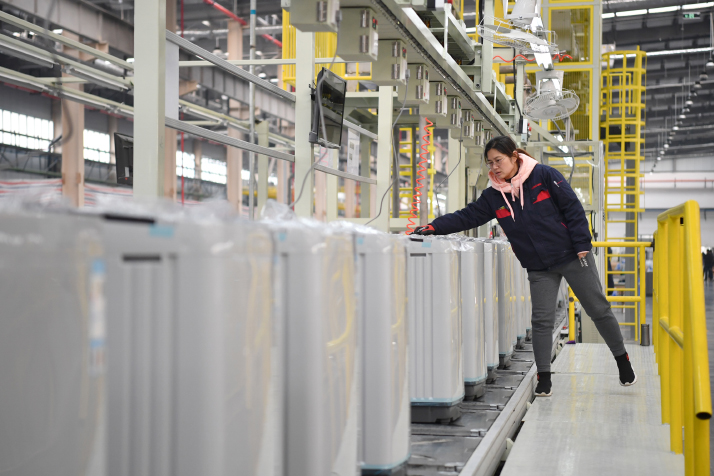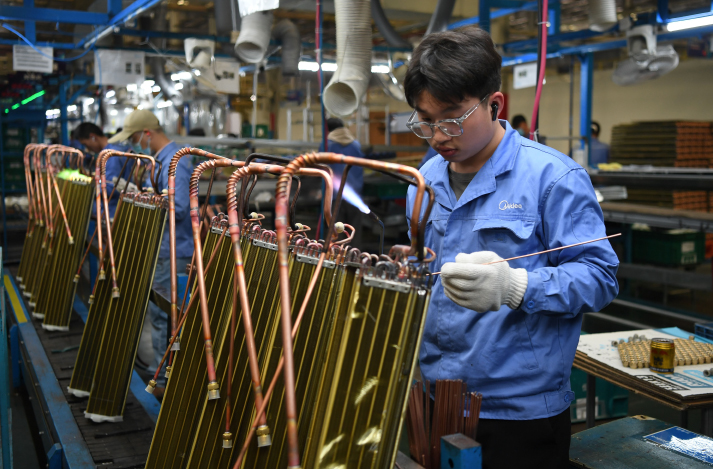| China |
| China offers stronger policy support for home appliance recycling | |
|
|
 A technician at work at a home appliance factory in Xi'an, Shaanxi Province, on February 22, 2023 (XINHUA)
China is home to a thriving private market for recyclables. Collectors and dealers of recyclables from cardboard boxes to laptops are often seen cruising down streets and alleyways on electric tricycles to collect recyclables from residents in the neighborhood.
It was one of these dealers that a resident, surnamed Zhao, of Zhengzhou, Henan Province, called when he wanted to replace his seven-year-old air conditioner with a more energy-efficient one. However, after inspecting the old unit, the dealer not only offered a price far lower than expected, but also charged a fee for carrying it away, Zhao told The Economic Observer newspaper. Residents like Zhao are expected to soon get a better deal when replacing their old home appliances as the replacements have recently been repeatedly encouraged by the government, and a government document issued in late January states that professional and large recycling enterprises will be supported to collect waste home appliances and furniture in residential areas.  A technician on an air-conditioner production line at a factory of Midea Group in Guangzhou, Guangdong Province on March 3, 2023 (XINHUA)
Policy signals The government has encouraged the replacement of old household appliances with new ones in recent years, and this year it has reiterated its emphasis on it. The government work report delivered to this year's session of the National People's Congress on March 5 mentioned the replacement of old consumer goods with new ones as part of efforts to expand consumption. On February 23, the Fourth Meeting of the Central Commission for Financial and Economic Affairs stressed that large-scale equipment renewal and trade-in of old and waste consumer goods including home appliances and furniture will effectively boost investment and consumption. In late January, nine central government departments including the Ministry of Commerce (MOFCOM) issued guidelines on developing a sound recycling system for recyclables such as old and waste household appliances and furniture, stating that China will cultivate model cities and leading enterprises in recycling such items and promote new recycling models. By 2025, the nationwide volume of recycled waste household appliances and furniture is expected to increase by more than 15 percent from 2023 levels, according to the document. "A sound recycling system for recyclables such as waste household appliances and furniture is important for facilitating trade-in of old products for new ones and boosting consumption," He Yadong, a spokesman for the MOFCOM, said at a news conference on February 1 in Beijing. Xu Dongsheng, Vice Chairman of the China Household Electrical Appliances Association (CHEAA), told financial news outlet Yicai that promoting the exchange of old home appliances for new ones is one of China's key measures for boosting consumption this year. The necessity of recycling According to the MOFCOM, China's households own more than 3 billion home appliances in major categories such as refrigerators, washing machines and air conditioners. As many of these appliances have been in use for more than 10 years, there is a huge potential demand for replacing old home appliances with new ones. According to data of CHEAA, the number of old home appliances being dumped has been increasing at an annual rate of 20 percent, with more than 200 million old home appliances dumped in 2022 alone. According to standards published by CHEAA in 2020, most home appliances in China have a life expectancy of eight to 10 years. Unknown to many consumers, after this period, while an appliance may still function well, it is no longer considered fit for use. According to a report on the home appliance recycling industry released by Cinda Securities in March 2022, home appliances that have passed their life expectancy are prone to safety hazards such as electricity leakage and fires caused by aging circuits, and can also become less energy-efficient and waste more power. Therefore, it is necessary to replace and recycle them after they reach their life expectancy, and use more efficient upgraded ones. However, currently, only 20 percent of old home appliances in China are recycled in an environmentally friendly way. The rest are disassembled in small, largely unregulated workshops, which only retain the economically valuable components and discard the remainder, often in environmentally unfriendly ways. Home appliances contain harmful materials such as heavy metals and organic solvents, which have the potential to pollute the environment and pose health hazards to humans if not treated properly. In addition, some valuable materials are not recycled in small workshops, which often lack the necessary technology and know-how. Cell phones, for example, contain more than 60 kinds of recyclable materials. In the hands of a technologically advanced recycling company, 200 grams of gold can be extracted from every ton of old mobile phones. Fulfilling responsibility Xu told Yicai that under the guidance and support of the new policy, home appliance producers will shoulder their Extended Producer Responsibility (EPR) and explore creative cooperation models with home appliance collection and recycling companies to promote the replacement of old home appliances with new ones and recycling of the old ones. According to the Organization for Economic Cooperation and Development, EPR is an environmental policy approach in which a producer's responsibility for a product is extended to the post-consumer stage of a product's life cycle. In July 2021, the National Development and Reform Commission (NDRC), the Ministry of Industry and Information Technology (MIIT) and the Ministry of Ecology and Environment issued a notice encouraging TV, refrigerator, washing machine and air conditioner producers to fulfill their EPR. The notice encouraged these producers to cooperate with e-commerce platforms and home appliance retailers to carry out campaigns to facilitate consumers exchanging old home appliances for new ones and promote the recycling of old ones. To further encourage home appliance producers to fulfill their EPR, the NDRC and MIIT issued a notice in May 2022, which set recycling targeting for six home appliance producers: Haier Group, Gree Electric Appliances, TCL Technology Group, Sichuan Changhong Electric Co. Ltd., Midea Group and Hisense Group. In 2022, these six companies recycled 17 million TV sets, refrigerators, washing machines and air conditioners, accounting for one fifth of the national total. The circular issued by the nine departments in late January again emphasized the need to guide home appliance makers to fulfill their EPR. The circular said home appliance and furniture makers will be encouraged to use environmentally friendly materials that are easily recycled in their production processes. The circular also supported recycling enterprises use online platforms to carry out recycling. Under the model, customers will be able to request doorstep-collection of old appliances by manufacturers. Home appliance makers and Internet companies are encouraged to improve services for assessing the price of old home appliances online. (Print Edition Title: From Trash to Treasure) Copyedited by G.P. Wilson Comments to jijing@cicgamericas.com |
|
||||||||||||||||||||||||||||
|
